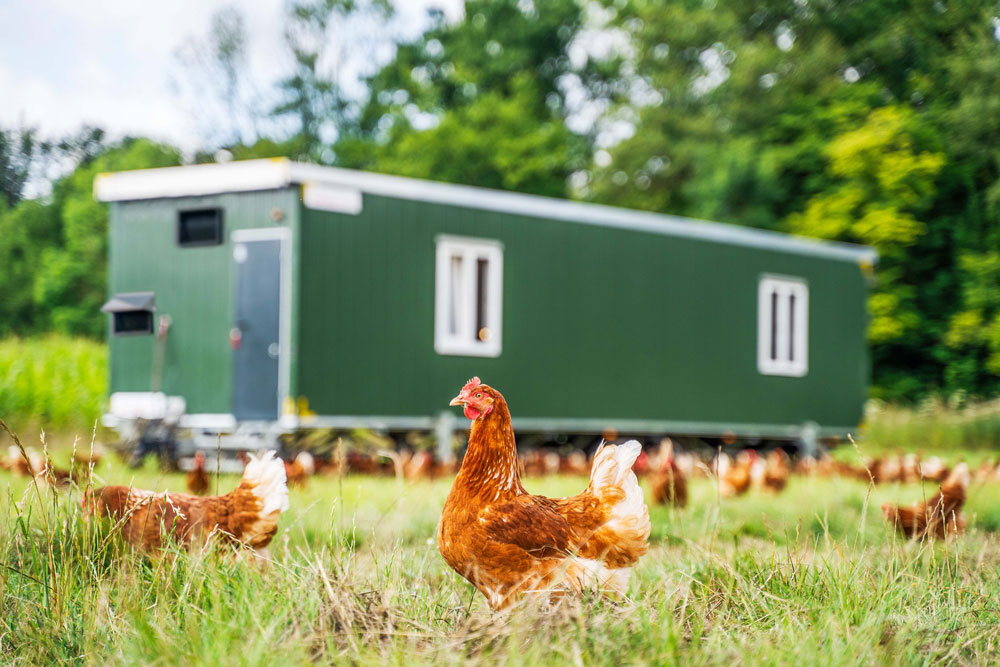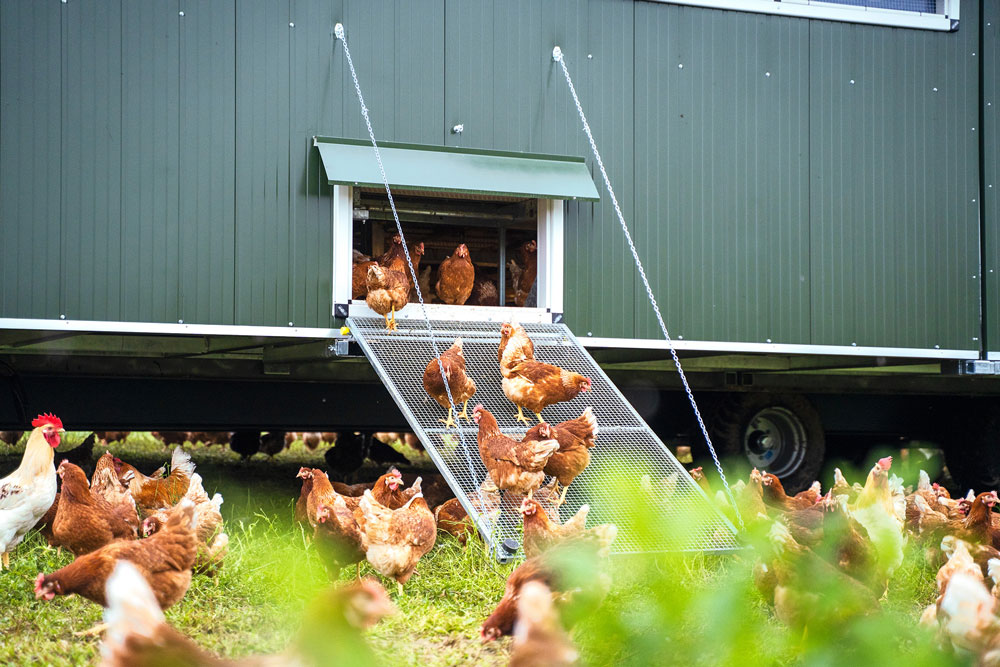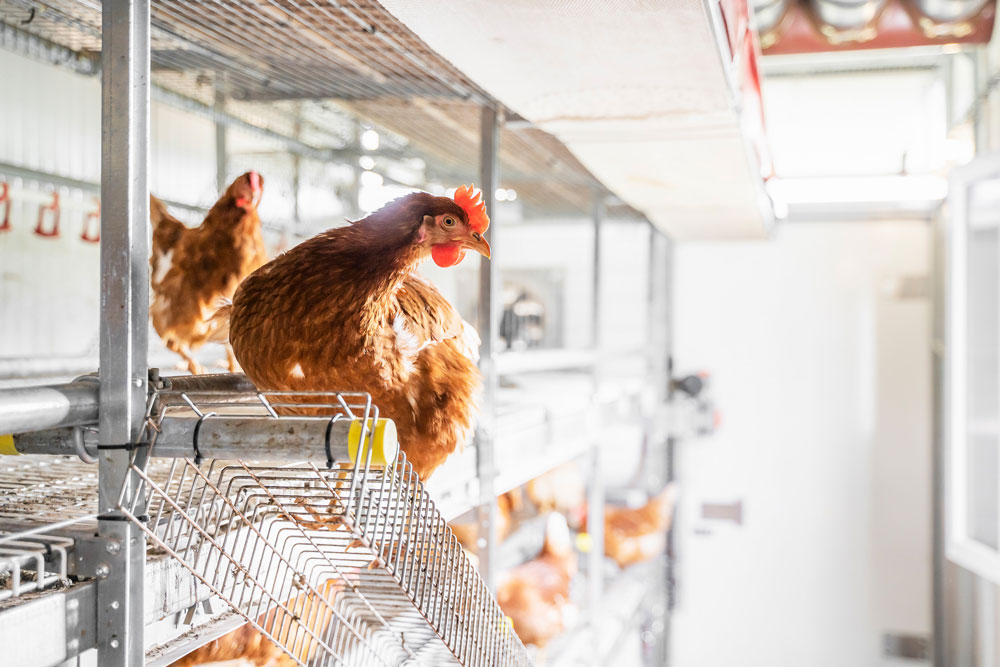German mobile company to expand in UK market
Published on : 7 Jun 2023

Farmermobil GmbH are a leading manufacturer of mobile houses for laying hen husbandry
Sales of mobile poultry housing are on the move and one German manufacturer is certainly not standing still.Mobile poultry keeping is becoming more and more popular and for good reason. This housing system is quick to set up and is very scalable. Plus, being able to move stock around the land, reduces poaching and contributes positively to animal health and welfare.The ability to free-range on regularly rotated pastures, provides access to a variety of plants and insects that can supplement poultry diets and a varied diet can lead to higher quality egg production. In addition, farmers can make the most of their open space, managing the land more efficiently and increasing soil fertility, as the chicken manure is spread over the pasture areas as natural fertilizer. This can also help reduce the cost of purchasing fertilizer and reduce the environmental footprint of farming. Widley available in the USA and Eastern Bloc countries, Mobile chicken coops or “tractors” as the Americans call them, offer smaller commercial producers a ready-made solution for flock housing. Even Jeremy Clarkson’s Diddly Squat Farm boasts a mobile unit that he imported from Poland.
Francisco explained: “The use of mobile layer houses enables more sustainable agriculture by allowing farmers to keep their layers in a natural way..."
Farmermobil launch into UKOne German company that is hoping to expand into the UK market is Farmermobil GmbH. As the name suggests, they are a leading manufacturer of mobile houses for laying hen husbandry, originating from the Münsterland region in Germany. They set up in 2014. By November the following year had already delivered their first shed unit. Since then, they have produced and successfully delivered over 1,000 mobile barns in Austria, Switzerland, France, Lithuania, Azerbaijan, USA and Ireland. They are hoping to break into the UK market this year. As their UK representatives, Francisco Dias and Dr. Gergana Grozeva advised: “Farmermobil GmbH manufactures all its barns completely in Germany. We construct everything ourselves, starting from the chassis to the finished mobile hen house, complete with all necessary electronic equipment. After completion, the mobile barn is delivered from Germany to the UK”.Their range includes nine mobile barns:STARTER-Series• STARTER-compact: 136 organic & 204 conventional• STARTER-plus: 230 organic & 345 conventional• STARTER-max: 300 organic & 450 conventionalThe STARTER-plus combines animal-friendly and labour-efficient mobile housing with compact dimensions. This means that even smaller areas can be reached and used with the mobile barn unit.Fm-Series XL• Fm 450 XL: 600 organic & 900 conventional• Fm 600 XL: 800 organic & 1200 conventional• Fm 1000 XL: 1200 organic & 1850 conventional• Fm 300 XL: 1650 organic & 2500 conventionalHm-Series• Hm-compact: 137 organic & 139 conventional• Hm 400: 375 organic & 410 conventionalTo save farmers valuable working time, the metal hen houses are operated fully automatically via a barn computer. The automation technology includes light control, chain feeding, nest opening/locking, outlet opening, a ventilation system and electric manure and egg collection belts. This reduces the required labour to a minimum. The feed and water supply for the layers is provided by an automatic chain feeding system and nipple drinkers from an internal feed silo and water tank. The houses are conveniently mucked out via electrically driven manure belts, saving the farmer laborious manual work. To muck out, the farmer simply opens the rear doors, places a suitable trough under the rear and activates the manure belts via the switch. There is also a scraper at the end of the manure belt to ensure that as little residue as possible is carried back into the barn. Regular mucking out ensures a good stable climate. The manufacturers recommend that this should be done at least once a week. Francisco explained: “The use of mobile layer houses enables more sustainable agriculture by allowing farmers to keep their layers in a natural way. The mobility of laying hen houses reduces the point-source input of nitrates. In addition, there is a growing market for sustainable, animal-friendly, and locally produced food. Mobile hen houses can help improve customer loyalty by showing consumers that as a farmer you value animal welfare and sustainability.”“Our company was founded to help farmers to optimise their chicken keeping and to operate a more sustainable and environmentally friendly agriculture. We also had the goal to create a labour-saving solution to enable newcomers in chicken farming to enter the industry without a lot of work and to generate a good side income. The design of the mobile units uses low maintenance materials and allows for a high degree of automation, in all our mobile barns, from the smallest to the largest size. This high degree of automation and use of durable materials is an important factor for optimal animal care and reduced maintenance costs”.Leading the fieldFrancisco explained that: “When we originally set up, the construction of mobile hen houses was still a niche product. Since then, some producers have tried to build a mobile house in a similar way as Farmermobil GmbH, but without success. Thanks to our own R&D department, we can clearly stand out from our competitors and have secured a strong market advantage.Our goal is to provide farmers with the opportunity to undertake high quality laying hen husbandry with minimal effort. In this way, we enable our customers to practice an innovative and sustainable form of animal husbandry with a particularly high standard of animal welfare. Through our expertise, we have been able to continuously develop the materials used in the construction of our barns over the years. This has enabled us to achieve a long service life and durability for our barns”.DeliverySome mobile barn systems are delivered already assembled and others require further assembly work on site before they are ready for use.The STARTER-max and the STARTER-plus are delivered on a drop deck. Either a telescopic loader, a forklift truck or a tractor is required for pulling down. This makes it very easy to unload the STARTER. It is immediately ready for operation.The STARTER-compact is delivered without axle and drawbar. For unloading on site, two telescopic loaders or two front loaders capable of lifting at least 3 tons are required. The models from the Fm-series XL are delivered in several parts. The middle section is transported on a low bed, while the side boxes are transported separately. In this case, two side boxes fit on one truck bed. A telescopic loader with pallet forks is required to unload the mobile barn, which should have a minimum load capacity of 3 tons.The Hm-compact is delivered without axle and drawbar. For unloading on site, a telescopic loader capable of lifting at least 3 tons is required. The Hm 400 is delivered on a drop deck. Either a telescopic loader, a forklift or a tractor is needed to pull it down. This makes it very easy to unload the Hm 400. It is immediately ready for operation.Our STARTER-series mobile barns are delivered as a turnkey solution. The Fm-Series XL barns, which can stock up to 2,500 laying hens, are also ready for operation within a few hours of arriving on site, thanks to their modular design. Farmermobil are equipped with permanently installed chassis. This makes them fully mobile, so they can be moved easily and used flexibly. The "STARTER-plus" and "STARTER-max" barns may even be driven on public roads. This means that even areas further away from the farm can be used optimally.Farmermobil is the only mobile barn manufacturer that has its own aviary system and chassis. We develop, test and manufacture our chassis and the aviaries installed in the barns ourselves. This allows us to optimally match aviary and vehicle and we are not dependent on the specifications of a vehicle manufacturer or the product range of an aviary supplier. Only in this way was it possible for us to accommodate a fully automatic, computer-controlled aviary system in the smallest possible space, as in the STARTER-compact.All our mobile houses for laying hens are equipped with our proprietary aviary system, whereby hens have access to water, feed and nests. At the same time, the aviary ensures each hen has the prerequisite space for movement. Egg collection and cleaningThe hen houses are equipped with family nests, which have an automated tilting floor. Due to the natural slope from the nest floor, the eggs roll onto the adjoining egg belt after laying. On the collecting belt, the eggs lie protected from contamination and pecking by the hens until they can be removed in the entrance. The main entrance in the mobile house can also be used as a hygiene flush. In this entrance there is the "elevator", which ensures that the farmer can comfortably pack the eggs from the egg belt into his egg hump, for ease of use and efficiency.Compared to the more simply equipped mobile houses with a manure pit, the aviary systems we offer, provide more walkable floor space relative to the floor space of the house. Mobile barns with an aviary system are thus more mobile and manageable than manure pit barns. Mobile houses for 1,000 laying hens and more can only be achieved by using our aviary systems.The hen houses are conveniently mucked out via electrically driven manure belts, saving the farmer laborious manual work. For manure removal, the farmer opens the rear doors, places a suitable trough under the rear and activates the manure belts via the switch. There is also a scraper at the end of the manure belt so that as little residue as possible is carried back into the barn. Regular mucking out ensures a good stable climate. This should be done at least once a week.Flexible options“Our mobile barns can be individually adapted to your needs thanks to the numerous additional options. For example, you can have your unit equipped with a fully insulated floor for optimal climate control. An outdoor climate area is one of the extras we offer. Layers have a spacious barn and access to fresh air, accessing the outdoors via precipitation-protected outlet flaps. The flaps open and close automatically every day at fixed times and are designed in such a way that they do not touch the ground when opening. In case of extreme slopes, the flaps can be readjusted at any time. The units ensure good air quality, by being ventilated automatically several times a day, with additional ventilation offered via flaps, windows and doors. Furthermore, a mesh door can be installed behind the main entrance door, allowing for air flow.

Farmermobil will be exhibiting at BFREPA Live 2023 on stand number 40
Lead timesDepending on which model is chosen, production and delivery times may vary. For the STARTER-plus/max models, the turnaround time from production to delivery is about 2 weeks. For the Fm-models, this process takes approximately 3 to 3 ½ weeks. The arrival time depends on the destination or destination country.The mobile units of the Farmermobil series are delivered in ready-made modules that only then need to be linked together on site. All three mobile chicken coops in their range are fully mobile and ready for use within 2-6 hours. The commissioning of the large hen huts on site takes about 2-6 hours.Financials From a financial perspective, the costs per house do not increase proportionally to the size but increase gradually. This means that the cost per chicken place decreases steadily as the size of the coop increases, thus providing a cost-efficient solution.In Germany, the average price per is between 0,35-0,45€ per conventional egg, 0,40-0,55€ per organic egg. The ROI can be expected within 2-4 year, depending on the occurring costs on farm site (feed, labour, price per layer). Francisco and his team are passionate about good service, hen welfare and innovation. “Our customer service is always there and available to offer advice, because customer satisfaction comes first in our way of working. Our in-house service teams have years of experience in maintaining and servicing our barns. They can also provide a tip or two on barn operation.We would also like to open this opportunity to other farmers around the world, thus helping to improve animal welfare for more and more laying hens. We are striving to open more countries for us in the future and to expand our commitment.Stand 40 at the BFREPA Conference“We are looking forward to exhibiting at the upcoming BFREPA event in Telford, in November. We decided to participate because we do not have a mobile hen unit in the UK as yet and this fair is an excellent opportunity to introduce our products to the UK market.Our aim at the show is to make contacts and inform and educate potential customers about the benefits of mobile housing for laying hens. We are confident that our presence at the BFREPA show will help us reach a large audience in the UK, and we hope to expand our customer base and raise awareness of mobile housing in the UK.We look forward to welcoming you to stand #40 and telling you all about our innovative mobile barns”.
